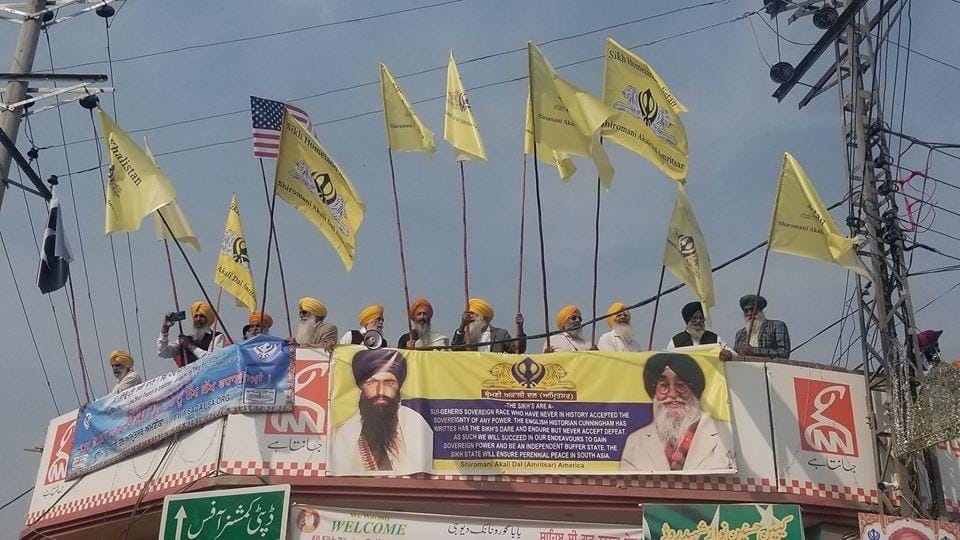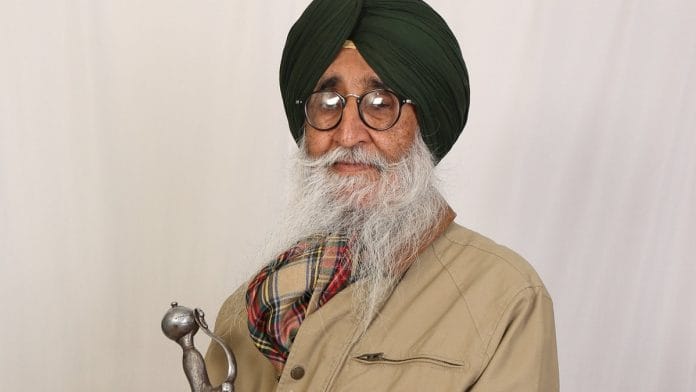New Delhi: A tough police officer who once cracked down on drug smugglers in Punjab. A radical Sikh leader who advocates for Khalistan. A Lok Sabha MP who was once stopped from carrying a kirpan to Parliament. Simranjit Singh Mann has been several different things over the years, and now, after about two decades on the electoral margins, the 77-year-old has once again assumed political significance in Punjab.
The president of the Shiromani Akali Dal (Amritsar) — which is a splinter group of the Shiromani Akali Dal led by the Badal family — Simranjit Mann sprang a surprise this Sunday when he won the by-election to the Sangrur Lok Sabha seat by a margin of 5,822 votes and a voteshare of 35.61 per cent.
The seat is the home turf of AAP leader and Chief Minister Bhagwant Mann, who took office just three months ago after his party recorded a massive victory in the Punjab assembly polls. Bhagwant Mann had been MP from Sangrur since 2014 and the seat fell vacant when he took charge as Punjab CM.
While Simranjit Mann was elected an MP from Tarn Taran in 1989 and again from Sangrur in 1999, neither he nor any other leaders from the SAD(A) won any elections in the ensuing years and witnessed a plummeting voteshare over time.
The SAD(A) leader’s apparent comeback, therefore, has invited plenty of speculation, with some political observers attributing his unexpected success to a revival of radical Akali politics, partly due to a build-up of disaffection with the AAP, especially in the wake of popular singer and Congress leader Sidhu Moose Wala’s murder this May.
Also Read: Simranjit Singh Mann is reborn because there’s an uneasy vacuum in Punjab
A decline reversed — after rise of Akali politics
Between 2004 and 2019, Simranjit Mann contested all the Lok Sabha polls but his voteshare witnessed a nearly continuous decline, according to data from the Election Commission.
In 2004, he stood third in Sangrur with 26 per cent votes — down from 41.7 per cent in the previous polls. In 2009, he went further down to the fifth position and a meagre vote share of 3.62 per cent.
In 2014, he experimented with contesting from the Khadoor Sahib seat, but ended up recording his worst electoral performance ever with a vote share of 1.34 per cent. In 2019, he went back to Sangrur, where his vote share witnessed a marginal increase to 4.37 per cent.
During this period, his performance in the assembly elections, too, followed a similar trajectory. He unsuccessfully contested from the Dhandoli (2007), Fatehgarh Sahib (2012) and Barnala (2017) assembly seats, where his voteshare went from 15 per cent in 2007 to 2.9 per cent in 2012 and 3.8 per cent in 2017.
Mann’s victory this month in Sangrur, therefore, especially in the wake of Punjab’s AAP wave, is remarkable.
Speaking to ThePrint, Pramod Kumar, director of the Institute for Development and Communication in Chandigarh, said there is a resurgence of Akali politics in Punjab, “with dominant shades of radicalism”, and Mann’s victory is reflective of this.
“There are three broad components of this politics — panthic, provincial and peasantry. It seems like [Mann] got support from all these components,” Kumar said.
Some political experts and observers also point out that the farmers’ agitation that started in 2020 and lasted for more than a year sparked old radical sentiments in several parts of Punjab, creating more space for unapologetic, Sikh-centric political voices.
They say that there is a vacuum in Sikh politics and a leader like Mann can be seen as occupying it at this point.

According to Ronki Ram, professor of political science at Panjab University in Chandigarh, the Sangrur result is being seen as a “strong message” to the AAP government from the masses who expect quicker delivery of its electoral promise of ‘badlaav (change)’.
“People voting for a candidate like Simranjit Singh Mann instead of going for a traditional political party is nothing but a strong message to the AAP. People demand quicker results in terms of structural changes from the AAP government. But it does not mean they have trust in other parties yet,” Ram said.
“The perception that Bhagwant Mann takes instructions from his party’s top leaders in Delhi seems to have acted against AAP too,” Ram added.
Feeding into this sense of dissatisfaction, both Ram and Kumar said, were heightened concerns about law and order in the wake of Sidhu Moose Wala’s death.
In this context, Mann’s background as a strong pro-Sikh voice as well as a police officer may have bolstered his appeal.
Career in IPS, and a radical turn
Simranjit Mann belongs to what may be termed a politically connected family.
His father Lieutenant Colonel Joginder Singh Mann (Retd), an Akali Dal leader, served as speaker of the Punjab assembly in the late 1960s. His wife Geetinder Kaur Mann is the younger sister of Preneet Kaur, who is the wife of Punjab’s former chief minister Amarinder Singh.
Mann began his career as a 1967-batch officer of the Indian Police Service (IPS), but resigned in 1984 in protest against Operation Blue Star, an Army operation against Khalistani separatists lodged in Amritsar’s Golden Temple.
Mann had earlier served as superintendent of police in the Punjab Police’s vigilance department and senior superintendent of Ferozepur and Faridkot districts, among other positions. During his tenure in Faridkot, he is learnt to have led a major crackdown on drug smugglers.
In 1984, when he quit the service, he was on deputation as a commandant in the Central Industrial Security Force (CISF) in Bombay (now Mumbai). At this time, Mann, known to always be a “deeply religious” man, was actively involved in the protests against Operation Blue Star.
In his resignation letter, he reportedly compared the Indian Army to General Dyer and its entry into the Golden Temple to the 1919 Jallianwala Bagh massacre, triggering the wrath of the government.
He was later imprisoned, facing charges such as sedition and waging war against the state. He was also reportedly probed in connection with the assassination of former Prime Minister Indira Gandhi.
Mann was in jail between 1984 and 1989. In late 1989, he was one of more than 100 Sikh prisoners who were unconditionally released by the central government, with all charges dropped.
But even now, on 6 June — the anniversary of the day soldiers stormed into the Golden Temple’s compound — Mann and his supporters continue to gather inside the complex and chant pro-Khalistan slogans.
Also Read: Crime, cult status, young death — Moose Wala killing brings focus on Punjab’s brutal gang feuds
Electoral rise
When he was still lodged in Bhagalpur jail, Mann contested the Lok Sabha polls in 1989 from the Tarn Taran seat and won. That year, his party, a splinter group of Badals’ SAD, won 6 out of 13 Lok Sabha seats in Punjab.
“This was also the peak period of militancy in Punjab. In this period, leaders like Mann witnessed big electoral gains,” said a senior Punjab-based Congress leader who did not wish to be identified.
In 1990, Mann grabbed headlines again when he insisted on carrying his kirpan — described as a Sikh article of faith — into Parliament, but was not allowed to do so.
Even today, Mann — who is over six feet tall and has a long grey beard — is rarely seen in public without a sword-like kirpan.
In the next two Lok Sabha polls, Mann did not see success but made a short-lived comeback in 1999 by wresting the Sangrur seat from Akali stalwart and former Union minister Surjit Singh Barnala.
‘He never gave up’
As Punjab slowly started emerging from the militancy era, support for Mann’s brand of politics started diminishing.
Since 1999, Mann and his party lost consistently at the hustings and failed to win even in the polls of the Shiromani Gurdwara Parbandhak Committee (SGPC) — a religious body from which Sikh politics in the state essentially draws strength.
But, Mann “never gave up”, said a Punjab-based leader who is now in the Congress.
There was a reason for this. As militancy declined in Punjab, the SAD led by the Badals started embracing mainstream nationalism more tightly, the leader said, but many traditional Akali voters did not like this.
“So, as a radical Sikh-centric voice, Mann always saw room for his kind of politics,” the Congress leader added.
This space widened when the farmers’ agitation against three new farm laws — now repealed — began in 2020.
“Mann played an active role in the farmers’ agitation which earned him mass support and eventually contributed massively in his re-emergence,” a former civil servant from Punjab said.
This renewed prominence reflected in the 2022 assembly polls, which Mann contested from the Amargarh seat in Malwa region.
Even though he lost to the AAP by a margin of around 6,000 votes, he managed to get a vote share of 30 per cent — a significant improvement in his electoral performance over the last two decades. This was even more meaningful considering it was at a time when the state’s AAP wave had led to several political big guns losing their seats.
Popular Punjabi personalities such as Deep Sidhu, who was also actively involved in the farmers’ agitation, campaigned for Mann ahead of the 2022 assembly polls. While Sidhu died in a highway accident five days before the 20 February polls in Punjab, his support translated into votes for Mann, said a senior leader in the SAD.
“In his poll campaign, Simranjit Singh Mann often claimed that Sidhu Moose Wala had assured [him] that he would lend his weight for Mann’s candidature in Sangrur. Moose Wala’s killing on 29 May, amid heightened concerns about the law-and-order situation in Punjab, undeniably had an impact in the Sangrur bye polls,” a senior Punjab-based AAP leader said.
Moose Wala, a popular Punjabi hip-hop singer and Congress politician, has a huge fan base in the state.
A large number of his supporters were already blaming the AAP government for pruning down his personal security a day before his death. Later, the Punjab government’s stand in terms of dubbing Moose Wala’s killing as a case of “gang rivalry” further backfired — forcing the AAP to later bring a nuanced shift in its stand.
Mann’s party entirely led its Sangrur campaign on emotional appeals — often talking about Mann’s “sacrifices” for Punjab’s welfare, seeking to rekindle old sentiments around the Khalistan issue, assuring the release of Sikh prisoners, broaching the subject of Moose Wala’s death. Some party members even highlighted Mann’s age, claiming that this could be his last chance to be in Parliament.
After winning the Sangrur bypoll Sunday, Mann said his victory was a big win for the “teachings” of Jarnail Singh Bhindranwale, a controversial religious leader who was killed during Operation Blue Star.
“We were mocked that we will not be able to win,” he told mediapersons. “All the parties… will be perplexed because we have won after a long time.”
(Edited by Asavari Singh)
Also Read: Simranjit Mann drops ‘Striving for Khalistan’ from Twitter bio after bypoll win, then restores it






